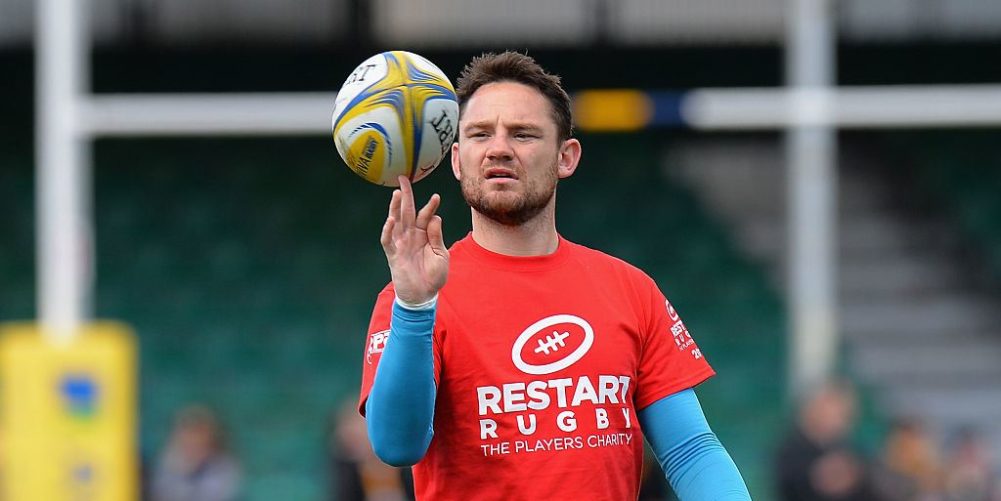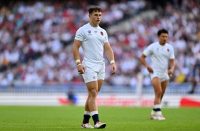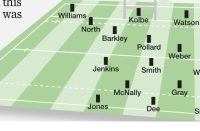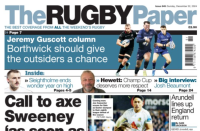Newly appointed Hartpury backs coach Ryan Lamb, 34, tells NEALE HARVEY how he landed his first coaching gig and offers his views on the game after a colourful career encompassing spells at fly-half for Gloucester, London Irish, Northampton, Leicester, Worcester, La Rochelle and Scarlets.
How did you get the job at Hartpury?
Being a local lad, I know the history of Hartpury and how well the rugby programme has progressed. I knew a few lads within the set-up and when Jon Goodridge left, I applied for the job. For an aspiring coach it was a job that I really wanted because you can coach at so many different levels from the U18s to the BUCS and Championship sides. It will be really good to tailor sessions accordingly and for development as a coach, I don’t think there’s anywhere better to transition from being a player.
Who else did you know there prior to joining?
James Forrester’s doing the university and women’s teams so we can share a few roles there and Mark Cornwell, our head coach, is someone I also knew well from Gloucester. He’s been brilliant with me, along with director of rugby John Barnes, and it’s been great to come in and ask questions and feel comfortable without trying to impress people straight off. We’ve also got Rhys Oakley in the office and doing the forwards, who I played with at Northampton.
Has coaching always been on your radar?
No, it wasn’t until two or three years ago when I got told I might be pretty good at it. When I was at Worcester I had quite a lot to do with the younger lads and then when I wasn’t playing too much in my second year at La Rochelle, I took quite a few skills sessions with the young guys there.
It was the same at Scarlets last year where they gave me a lot of responsibility in mentoring. Passing on knowledge was something I really enjoyed – coaching lads who really wanted to progress. When I retired last March I realised how lucky I’d been to be involved in the game for so long and I feel privileged to be staying in it now. I had a coffee business on the boil but I’d like to make a real good go of coaching.
How satisfied were you with your playing career?
Very satisfied. There’s the obvious disappointment of never winning an England cap and I just fell short after twice being in the Saxons, but when you’ve got Jonny Wilkinson ahead of you anyone’s going to struggle.
There was a two or three-year spell when I felt I should have got a cap but it wasn’t meant to be and to have played professionally for 17 years and to have had the experiences I’ve had at some great clubs, I feel privileged.
There weren’t too many honours – a Challenge Cup win with Gloucester in 2006 and winning the Championship with Worcester in 2015 – but I’ve met so many people through the game, travelled and done so many things an ordinary lad from Gloucester wouldn’t normally have got to do without rugby.
When do you think you came closest to that England cap?
I played some really good rugby for a couple of years at Gloucester and also when I moved to London Irish in 2009. It was the same in my first year at Northampton so there was a period of four or five years where I was probably quite unlucky not to get a cap, but I’m not going to cry about it too much. It’s not about me anymore, it’s about helping guys at Hartpury to go on and play professional and international rugby.
As a local lad, do you regret leaving Gloucester in 2009?
Not really. I was 23 when I left but I came through at 18 and everyone thought I was going to be the finished article straight away and there was always a lot of heat around me.
You look at someone like Marcus Smith now and everyone says he’s got a lot of time on his side, but back then at 19 or 20, there was huge pressure on guys like me, Anthony Allen and Olly Morgan to deliver.
At the time, Gloucester were at a point where they had the budget and needed to win something, but maybe we were pitched in a bit early to do that.
Eventually I needed to get out of the goldfish bowl that was Gloucester, but I reckon I came out of it stronger mentally than I would have done if I’d had an arm around me like a lot of players do now.
Life-wise and growing as a person, moving to London Irish really enhanced that and being taken out of my comfort zone allowed me that opportunity. I’m pretty happy with how I’ve turned out.
English rugby can be a pretty conservative place, did being labelled a ‘maverick’ hurt you?
No. I liked to play the game on the edge and I liked to put my skills under pressure. I liked to entertain and when I was a child I enjoyed going to games and seeing someone do something out of the ordinary that stuck in your head. It’s a spectator sport and maybe I wanted to entertain more than seeing it as simply a results business, but, to be fair, at 18 or 19 everyone thought I had to be the finished article whereas now lads can be 22 or 23 and people are still prepared to give them another year to progress, which I happen to completely agree with.
Chucking people into top-class rugby too early can ruin a career – as you saw with Anthony Allen and England, where he played two games in 2006 and was never seen on that stage again. Sometimes the media hype can really affect people, but I think people have learnt that now and young lads these days get more time.
Would you like to see England No.10s like Owen Farrell and George Ford encouraged to throw off the shackles a bit more?
It’s a results business now but if you watched that North v South game in New Zealand the other week and some of their Super Rugby stuff, you can still play winning rugby but the brand of rugby is very different. England like to go a certain way and Owen is a world-class player, I don’t think anyone could argue with that – how many times has he won the European Cup? He’s got to a World Cup final as well so there are lots of ways to skin a cat.
It’s not the way I personally want to see the game played but England traditionally play a pragmatic game – very attritional, with big forwards and a decent kicking game – although we are slowly changing. We’ve got some very exciting back three players coming through who are a bit more in the southern hemisphere mould and some boys coming out of schools now have unbelievable skill-sets.
The weather here plays a part but it will be interesting to see how our game develops now because the ball’s in play a lot more Down Under and at junior levels they do things a little bit differently by doing things by weight, which is great because you have to work space more rather than just give the ball to a big guy who runs through everyone.
Do you really think weight-banding in youth rugby would make a difference here?
Yes. In England there’s always one guy who runs through everyone and no one actually develops, whereas in the southern hemisphere they move the ball a lot more and their core skills and passing ability are phenomenal.
We have a lot of good young players coming through but if you took away the old ‘biggest lad runs through everyone’ aspect, we’d have even more top players coming through. Even for those big lads themselves, as soon as they grow up they don’t have the core skills or game-understanding of how to use space they might have had from playing in an equal weight group, so it’s something we should look at.
Another thing that bugs me is how the Sevens programme has been scuppered because that’s brilliant for core skills, tackling, kicking and decision-making. I went into England Sevens camps and it can really help you transition into 15s, especially when you’re younger.
Of the future England fly-halves, who impresses you the most?
Marcus Smith. I think he’s a class player who’s a cut above the other young boys at the moment. He’s had a lot of senior rugby under his belt now and he’s going to be a special player.
He’s brave, he’s determined, has great skills and his kicking game is very good.
He seems like the guy who will have his hand in the air when Farrell and Ford fall off a bit, although that’s still probably some way off yet.
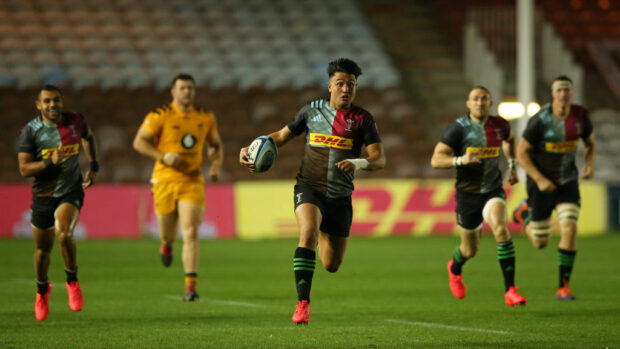
England have got some good riches at No.10 but Marcus is definitely waiting in the wings. If he keeps progressing over the next couple of years in high pressure games for Harlequins, I think he could make the step up to England seamlessly.
Which other No.10s impress you?
Callum Sheedy and Joe Simmonds have good packs in front of them at Bristol and Exeter and are very capable players. Jacob Umaga is coming through well at Wasps with Jimmy Gopperth alongside him to calm him down and then there’s Manu Vunipola, for whom regular game time in the Championship with Saracens might not be the worst thing. But really, I’d like to see Marcus Smith in there sooner rather than later.
What would your advice be to all these young 10s?
Just keep enjoying it because it’s a time in their careers when they’ll be under the least pressure and big occasions can pass you by so quickly. In my first full season at Gloucester we reached the 2007 Premiership final and when you’re young you think it’s going to happen every year, but they don’t come around very often. They’re hard to reach, so just enjoy them and don’t hold back.
If you were England’s coach, what would your ideal 10, 12, 13 combination look like?
I always like a ball player at 10 and 12 and I quite like Ford and Farrell together, with maybe Marcus pushing as well.
Alex Goode must feel gutted not to have won more caps because he’s shown from full-back how good a second distributor he is and anywhere he plays he’s world-class. As he’s just proved again for Saracens, he’s an international player in every respect. And then the 13 and strike runners off the wings are more like fast back rowers who are all over the place.
You see the way Exeter play and there’s so much movement at the back that their attack is forcing the opposition defence to make decisions all the time because there are so many different options. I like Henry Slade floating anywhere and getting on the ball whenever he can. He’s a devastating runner one-on-one with his acceleration, he’s got great vision and a fantastic left foot.
Of all the coaches you played under, who left the biggest impression?
I really enjoyed playing under Sam Vesty at Worcester. The way he handled players, you knew exactly where you stood, which is all most players ask for.
A lot of head coaches give you political answers over selection or tactics but with the way Sam coached, he got results and you’ve only got to look at how someone like Josh Adams came through. His messages were clear, concise and uncomplicated whereas some coaches like the sound of their own voices and how many syllables they can fit into a word. Messages get lost, so simple is always the most effective for me.
I also think Exeter are very well coached so I’m studying them a lot.
Have you approached Exeter to try and spend some time with them?
I had a chance to sign for them before I joined Leicester in 2013 so maybe they won’t like the fact I turned them down!
That’s probably my one regret in rugby that I didn’t go to Exeter because I respect their coaching team and the way they want to play. Yes, they’re pragmatic, but they also have some fantastic shape and wonderful ball players.
For me, Jack Nowell is one of the best wingers in the world and Joe Simmonds is coming through and pulling the strings, so if I could be a fly on the wall in that coaching office I’d be very happy.
They’ve built organically, haven’t spent ridiculous amounts of money, they make boys want to play for them and the fanbase is brilliant. They’re the blueprint for any successful team.
How did you enjoy your two years at La Rochelle?
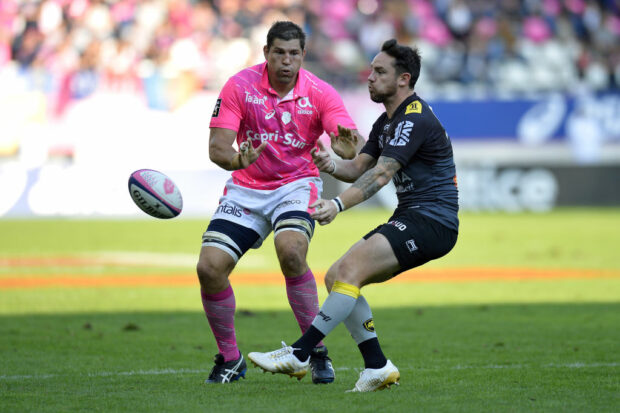
France is a strange place because depending on whether you’re home or away it’s like being in two different teams. As long as you win your home games, everything’s fine!
But the Top 14’s a great place to play and I’d recommend it to anyone, especially a young lad because everything’s a lot freer and nowhere near as structured.
I thought I liked a loose game, but even I was left needing a bit more structure when I was there. It was a really good experience and everywhere you looked, teams were full of superstars.
There’s two-up, two-down in France which seems to fuel interest, but here we’re looking at scrapping relegation. Your thoughts on that?
I don’t like that idea one bit. Look, I understand all the arguments behind ring-fencing and putting everything towards developing players for the national team, but without the drama of promotion and relegation the last two or three months of the season would be a disaster because you might have three or four teams with nothing to play for.
Like we’re seeing now, you end up with mismatches and it takes the spice out of the rugby. And what would the Championship boys be playing for? I played in a Championship final with Worcester in 2015 and when you’re in that position and see the ecstasy and agony of winning and losing, it would be a shame to lose that drama.
Was that last gasp winning kick against Bristol your finest moment?
No, I liked the one I kicked from half-way for London Irish at the death to beat Leinster 12-9 at the RDS in 2009. We were the first team to beat them there in the Heineken Cup and to beat what was pretty much the Ireland team at the time was special. Put it this way, we had a bloody good night!

